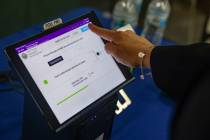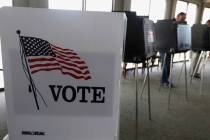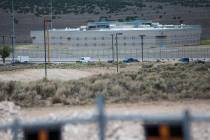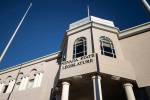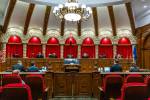Legislators face Friday the 13th cutoff
CARSON CITY -- The 10th week of the 2007 Nevada Legislature, which opens Monday, will end with some bad luck for hundreds of bills not expected to survive a Friday the 13th deadline for committee approval.
Under the lawmakers' rules, Friday is the last day for all Assembly committees to vote on any Assembly measures that have not yet been acted upon, and for all Senate panels to decide on any of their Senate bills with the same status.
With some exceptions, measures left in the committees by the end of the day Friday are dead for the session, unless their sponsors can get their concepts resurrected in the form of an amendment to another bill that survived the deadline.
More than 270 measures died at the same point in the 2005 session, a fourth of all bills introduced that year.
This year, the same scenario is possible for roughly the same number.
In advance of the deadline, committees will hold marathon work sessions to act on bills they've already heard. They also will try to complete hearings on measures that have not yet been fully debated and decide on those measures.
Monday's hearings include a Senate Finance Committee hearing on Senate Joint Resolution 7, which would amend the Nevada Constitution to add provisions of the Tax and Spending Control, or TASC, initiative that was stripped from the 2006 ballot by the state Supreme Court.
The government spending plan proposed to limit local and state government spending increases by using a formula based on the rate of inflation.
Also on the Finance Committee agenda is Senate Bill 416, which would create a fund to stabilize operations of Nevada's public schools.
A Senate Government Affairs subcommittee will again review Senate Bill 123, which started out as a plan to require government agencies to respond in two business days to a public records request.
Proposed amendments would change that to anywhere from five to 10 days.
The Assembly Commerce and Labor Committee plans a work session on several bills, including Assembly Bill 115, a scaled-back plan to increase inspections of mercury emissions at mining operations.
The Assembly Government Affairs Committee will hear Assembly Bill 601, which provides for collective bargaining for state employees.
The Senate Human Resources and Education Committee considers Senate Bill 398, setting up a pilot program for English immersion in public schools; and Senate Bill 415, which tightens rules to prevent illegal immigrants from getting the state's higher-education scholarships.
On Tuesday, a joint Senate-Assembly budget panel reviews funding plans for Nevada's public schools. Critics say funding plans from both Democrats and Republicans would still leave the state near the bottom among all states in terms of per-pupil support.
The Senate Taxation Committee will debate Senate Bill 324, aimed at helping to resolve a $3.8 billion shortfall in road construction funds.
The Senate Legislative Operations and Elections Committee reviews Senate Bill 494, which revises the periods for reporting campaign contributions and expenditures; and Senate Bill 492, which provides a process for verifying electronic tabulation of votes.
Among the many work-session meetings is a Senate Judiciary session on about 20 measures, including Senate Bill 85 on eminent domain proceedings; Senate Bill 232 and Senate Bill 471, dealing with sex offenders; and Senate Joint Resolution 2 dealing with judicial selection.
Also on the Judiciary Committee's agenda are Senate Bill 204 on grandparents' rights to visit grandchildren; Senate Bill 302, which would stop credit card companies from raising interest rates when consumers fail to make car payments or pay power bills on time; and Senate Bill 542, expanding a state homestead exemption.
On Wednesday, the Senate Finance Committee plans to close various budgets and to review several bills, including Senate Bill 248 which boosts annual base pay of justices of the state Supreme Court from $140,000 to $182,000.
The Assembly Ways and Means Committee also will close budgets, and review various bills including Assembly Bill 170, which would tighten the qualifications for the state's Millennium Scholarships.
The Assembly Commerce and Labor Committee reviews Assembly Bill 532, which restricts credit or debit card fees and imposes $5,000 penalties for violations; and Assembly Bill 446, which revises the way in which prescriptions for controlled substances are tracked.
On Thursday, a joint Senate-Assembly budget panel will review the Nevada System of Higher Education budget. Cuts in the system's budget, suggested by the governor as part of an effort to balance state spending, have been rejected by the system's chancellor, Jim Rogers, as destructive to higher education in Nevada.
Also Thursday, the Assembly Taxation Committee considers Assembly Bill 588, which reduces some of the state taxes imposed on banks and other businesses; and Assembly Transportation takes up Assembly Bill 583, authorizing local governments to operate toll roads and toll bridges.
On Friday, as the committee action deadline hits, the Senate Finance Committee will make decisions on numerous measures, including Senate Bill 453 which extends a slot tax that funds a problem gambling program.
2007 Nevada Legislature
ON THE WEB
www.reviewjournal.com/news/legislature/2007/
www.leg.state.nv.us








